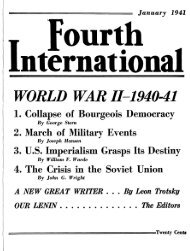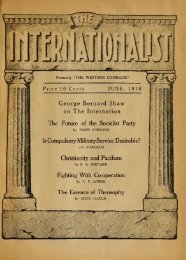National Liberation Movements and the Question of Socialism ...
National Liberation Movements and the Question of Socialism ...
National Liberation Movements and the Question of Socialism ...
You also want an ePaper? Increase the reach of your titles
YUMPU automatically turns print PDFs into web optimized ePapers that Google loves.
to <strong>the</strong>ir knowledge in <strong>the</strong> light <strong>of</strong> experience,<br />
will come to show <strong>the</strong>mselves capable <strong>of</strong><br />
directing <strong>the</strong> people's struggle.<br />
( Fanon, ~Jretched, pp. 48, 99, 114.)<br />
As <strong>the</strong> peasants or small farmers are ~hose who.<br />
suffer <strong>the</strong> most from colonization, <strong>the</strong>n.thls class 1s<br />
<strong>the</strong> one with <strong>the</strong> most to lose from cont1~ued subservience<br />
<strong>and</strong> <strong>the</strong> most to gain from revolut1on. But ~hy<br />
is <strong>the</strong> small peasantry so oppressed <strong>and</strong> what does 1t<br />
want in <strong>the</strong> way <strong>of</strong> a solution to <strong>the</strong> problem?<br />
Peasants, as noted by Stalin some seventy years<br />
ago, are drawn into <strong>the</strong> national _movemen~ when l<strong>and</strong><br />
becomes an important issue (Stal1n~ Marx1sm <strong>and</strong> <strong>the</strong><br />
<strong>National</strong> <strong>Question</strong>, p. 20.) And, g1ven <strong>the</strong> nature <strong>of</strong><br />
modern imperialism with its control.<strong>of</strong> natural resource~,<br />
l<strong>and</strong> is, in most colonies, a major 1ssue. The peasants<br />
response to this issue is to dem<strong>and</strong> <strong>the</strong> return <strong>of</strong> <strong>the</strong><br />
l<strong>and</strong> over which <strong>the</strong>y lost control as a re~ult <strong>of</strong> <strong>the</strong><br />
monopoly capitalists' economic interests 1n <strong>the</strong> colony.<br />
That is, <strong>the</strong> peasant--in <strong>the</strong> main--wants to rest~re <strong>the</strong><br />
individualized control over <strong>the</strong> means <strong>of</strong> product1~n that<br />
existed prior to colonization. This, <strong>of</strong> course, lS ~ .<br />
petty producer position. And <strong>the</strong> petty produc~r pos~t1on<br />
is a capitalist position (<strong>of</strong> <strong>the</strong> petty bourgeo1s ~ar1~ty).<br />
Because <strong>the</strong>se <strong>the</strong>orists take on th~ peasants po1nt<br />
<strong>of</strong> view, <strong>the</strong>y necessarily suggest ~olut1on~ that are <strong>of</strong><br />
an individualist, anarchist or sem1-anarch1st temperment:<br />
The guerilla force~ <strong>the</strong> pa~ty ~embryo.<br />
This-ls <strong>the</strong> staggering novelty 1ntroduced by<br />
<strong>the</strong> Cuban Revolution.<br />
Any guerrilla 111ovement in Latin America that<br />
wishes to pursue <strong>the</strong> people's war to <strong>the</strong> end<br />
... must become <strong>the</strong> unchallenged political<br />
vanguard.<br />
The people's army will be <strong>the</strong> nucl~us <strong>of</strong><br />
<strong>the</strong>-party, not vice versa. The ~uerr1lla<br />
force is <strong>the</strong> political vanguard~ nuce <strong>and</strong><br />
from its development a real rarty can ansc.<br />
(Debray, Revolution in Revolution?, pp. lOG,<br />
1 09, 11 6. - --<br />
Thus, we observe something <strong>of</strong> a return to <strong>the</strong><br />
nineteenth century anarcho-syndicalist position in<br />
v1hich a "militant minority" begins <strong>and</strong> leads a revolutionary<br />
process, <strong>the</strong> majority eventually co~ing over<br />
to <strong>the</strong> side <strong>of</strong> this nucleus as a result <strong>of</strong> <strong>the</strong> educational<br />
force <strong>of</strong> <strong>the</strong> revolution itself. This, <strong>of</strong> course,<br />
is <strong>the</strong> foco <strong>the</strong>ory <strong>of</strong> Guevara <strong>and</strong> o<strong>the</strong>rs <strong>and</strong> places<br />
primary emphasis on <strong>the</strong> armed struggle ra<strong>the</strong>r than <strong>the</strong><br />
long-run education <strong>of</strong> <strong>the</strong> lower classes prior to <strong>and</strong><br />
following this phase <strong>of</strong> <strong>the</strong> revolution. In o<strong>the</strong>r<br />
words, it is a petty bourgeois program with its<br />
<strong>the</strong>oretical base lying in <strong>the</strong> ideology <strong>of</strong> <strong>the</strong> peasantry.<br />
But, as <strong>the</strong> peasantry is incapable <strong>of</strong> leading <strong>and</strong> consolidating<br />
a revolutionary process (given its individualist<br />
outlook <strong>and</strong> contempt for any state apparatus),<br />
such a program amounts to h<strong>and</strong>ing leadership to <strong>the</strong><br />
capitalists who will use it for <strong>the</strong>ir own purposes.<br />
Marxists have always held that <strong>the</strong> small peasantry<br />
is <strong>the</strong> natural ally <strong>of</strong> <strong>the</strong> working class <strong>and</strong><br />
cannot be dismissed as a revolutionary force. At <strong>the</strong><br />
same time, <strong>the</strong>se <strong>the</strong>oreticians have argued (correctly)<br />
that only <strong>the</strong> working class, as a concentrated, centralized<br />
force is capable <strong>of</strong> bringing about <strong>the</strong> fundamental<br />
changes necessary for a socialist transformation.<br />
In <strong>the</strong> nationalist view <strong>of</strong> national liberation, this<br />
class composition is turned around: The peasantry is<br />
<strong>the</strong> only possible leading force while <strong>the</strong> working<br />
class is, at best, a secondary force.<br />
This anti-working class, p2tty bourgeois <strong>the</strong>ory<br />
extends to <strong>the</strong> treatment <strong>of</strong> revolutionary processes in<br />
<strong>the</strong> advanced imperialist countries as well. Herbert<br />
Marcuse, one <strong>of</strong> <strong>the</strong> most influential ideologists <strong>of</strong><br />
<strong>the</strong> 1960's--<strong>and</strong> former(?) C.I.A. agent--expressed<br />
utter contempt for <strong>the</strong> working class, charging it with<br />
being "one dimensional" <strong>and</strong> hopelessly corrupted as<br />
a result <strong>of</strong> alliance with <strong>the</strong> capitalist class. His<br />
revolutionary "class" was that <strong>of</strong> <strong>the</strong> "outsiders",<br />
those who had been left outside <strong>the</strong> mainstream <strong>of</strong><br />
18<br />
19
















